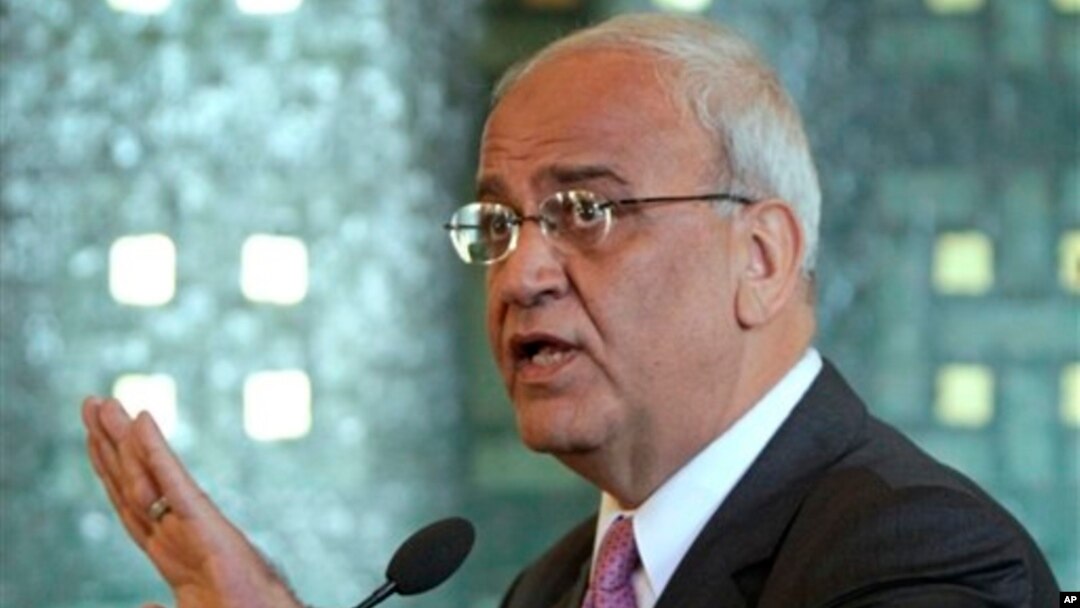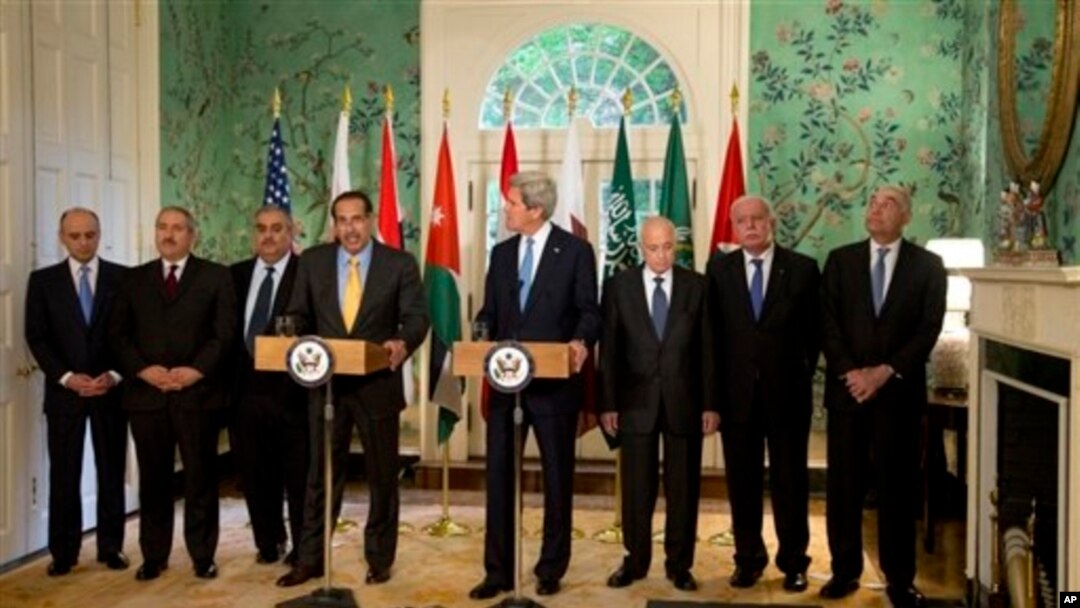WASHINGTON —
U.S. Secretary of State John Kerry is pressing ahead with his effort to restart Arab-Israeli peace negotiations through talks with key nations that drew up the decade-old Arab Peace Initiative.
On Monday and Tuesday, Kerry met with the prime minister of Qatar, the secretary-general of the Arab League, Nabil El-Araby, and representatives of Saudi Arabia, Egypt, Morocco, Jordan and the Palestinian Authority to discuss possible changes in the Peace Initiative that would be interesting to the Israelis.
The initiative was introduced initially by Saudi Arabia's then crown prince, King Abdullah, and was endorsed later by the 22-member Arab League at a summit in Beirut. The proposal offered comprehensive peace between Israel and the Arabs in exchange for a full pullout from all territories Israel captured in the 1967 Mideast war.
The Arab League re-endorsed the initiative in 2007, and the 57-member Organization of Islamic Cooperation has also endorsed it. Israel rejected the plan at the time.
A top Palestinian official said Kerry proposed changes to the Arab Peace Initiative to make it more agreeable to Israel – mainly that the 1967 lines “could be modified” through mutual agreement between Israel and the Palestinians.
Arab representatives, including Qatari Prime Minister Sheikh Hamad Bin Jassem Al Thani, said after Monday’s meeting with Kerry that it was agreed that “minor” and “comparable” land exchanges based on the 1967 lines would now be acceptable.

“The Arab delegation,” Erekat said, “presented the official Palestinian position: Upon Israel’s unequivocal acceptance of the two-state solution on the 1967 border, the State of Palestine as a sovereign country might consider minor agreed border modifications.”
Modified initiative
New or not, Israeli Justice Minister Tzipi Livni said Tuesday that such a change could allow Palestinians to "make the needed compromises" to further negotiations.
“This is a positive announcement,” Livni told Israel’s Chanel 10 TV, but added that “at the end, you need direct negotiations between the Israelis and the Palestinians.”
Her boss, Israeli Prime Minister Benjamin Netanyahu, made no immediate comment on Kerry’s talks in Washington. Previously, he had rejected any return to the 1967 lines, saying that would leave Israel vulnerable to attack.
This latest Arab position echoes President Barack Obama's 2011 call for Israel and the Palestinians to negotiate their borders on the basis of the 1967 lines with "mutually agreed swaps."
The Arab Peace Initiative, if adopted, would offer Israel "normal relations" with Arab League members and calls for providing "security for all the states of the region."
Why now?
Middle East Experts cite a number of reasons behind the move to resurrect the Arab Peace Initiative.
“The API (Arab Peace Initiative) stands out singularly because it was the initiative of the collective Arab political body,” said Philip Wilcox, president of Foundation for Middle East Peace, Her adds that it opens a way to bring Hamas, the Palestinian faction that controls the Gaza Strip, into the negotiations.
“The API offers Hamas, which must be an integral part of future negotiations, the opportunity to accept the API (joining the Arab states) without requiring it to recognize Israel in advance and without accepting prior agreements…,” Wilcox said.
On Monday and Tuesday, Kerry met with the prime minister of Qatar, the secretary-general of the Arab League, Nabil El-Araby, and representatives of Saudi Arabia, Egypt, Morocco, Jordan and the Palestinian Authority to discuss possible changes in the Peace Initiative that would be interesting to the Israelis.
The initiative was introduced initially by Saudi Arabia's then crown prince, King Abdullah, and was endorsed later by the 22-member Arab League at a summit in Beirut. The proposal offered comprehensive peace between Israel and the Arabs in exchange for a full pullout from all territories Israel captured in the 1967 Mideast war.
The Arab League re-endorsed the initiative in 2007, and the 57-member Organization of Islamic Cooperation has also endorsed it. Israel rejected the plan at the time.
A top Palestinian official said Kerry proposed changes to the Arab Peace Initiative to make it more agreeable to Israel – mainly that the 1967 lines “could be modified” through mutual agreement between Israel and the Palestinians.
Arab representatives, including Qatari Prime Minister Sheikh Hamad Bin Jassem Al Thani, said after Monday’s meeting with Kerry that it was agreed that “minor” and “comparable” land exchanges based on the 1967 lines would now be acceptable.

Saeb Erekat, chief negotiator for the Palestinian Authority, says his side had already agreed on minor border land swaps.
Saeb Erekat, chief negotiator for the Palestinian Authority, said Tuesday the changes worked out in Washington were not really new, noting that the Palestinian Authority had already agreed to minor land swaps.“The Arab delegation,” Erekat said, “presented the official Palestinian position: Upon Israel’s unequivocal acceptance of the two-state solution on the 1967 border, the State of Palestine as a sovereign country might consider minor agreed border modifications.”
Modified initiative
New or not, Israeli Justice Minister Tzipi Livni said Tuesday that such a change could allow Palestinians to "make the needed compromises" to further negotiations.
“This is a positive announcement,” Livni told Israel’s Chanel 10 TV, but added that “at the end, you need direct negotiations between the Israelis and the Palestinians.”
Her boss, Israeli Prime Minister Benjamin Netanyahu, made no immediate comment on Kerry’s talks in Washington. Previously, he had rejected any return to the 1967 lines, saying that would leave Israel vulnerable to attack.
This latest Arab position echoes President Barack Obama's 2011 call for Israel and the Palestinians to negotiate their borders on the basis of the 1967 lines with "mutually agreed swaps."
The Arab Peace Initiative, if adopted, would offer Israel "normal relations" with Arab League members and calls for providing "security for all the states of the region."
Why now?
Middle East Experts cite a number of reasons behind the move to resurrect the Arab Peace Initiative.
“The API (Arab Peace Initiative) stands out singularly because it was the initiative of the collective Arab political body,” said Philip Wilcox, president of Foundation for Middle East Peace, Her adds that it opens a way to bring Hamas, the Palestinian faction that controls the Gaza Strip, into the negotiations.
“The API offers Hamas, which must be an integral part of future negotiations, the opportunity to accept the API (joining the Arab states) without requiring it to recognize Israel in advance and without accepting prior agreements…,” Wilcox said.


